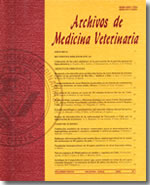Raw milk quality produced in small dairy farms in the South of Mexico City
Main Article Content
Abstract
The small-scale dairy farms are challenged to produce milk in a specific quantity and quality that encourages greater consumer demand and an appropriate transformation into cheese, yoghurt and candy, ensuring profitability. A study to assess the quality of raw milk stored in containers without cooling system was carried out in 30 production units located in the south of Mexico City, according to the standard PROY-NOM-155-SCFI-2003. The production units were evaluated during three seasons (dry, rainy and winter) and classified by the type of procedures for cleaning the udder, before milking (traditional, full and partial). The results showed that the milk component (fat, protein, casein, pH, acidity and cryoscopic point) were different depending on the time of sampling (P < 0.05), as well as mesophilic bacteria and somatic cell count (CCS), while lactose, total solids, non fat solids, density and reductase time showed no change (P > 0.05). During winter, a deep cleaning produced lower CCS and higher reductase time (P < 0.05) compared to the dry and rainy seasons. In conclusion, the nutritional components and physicochemical parameters of raw milk in household production units are within the Mexican standard range for raw milk, but the hygienic quality is deficient resulting from inadequate milking practices.

